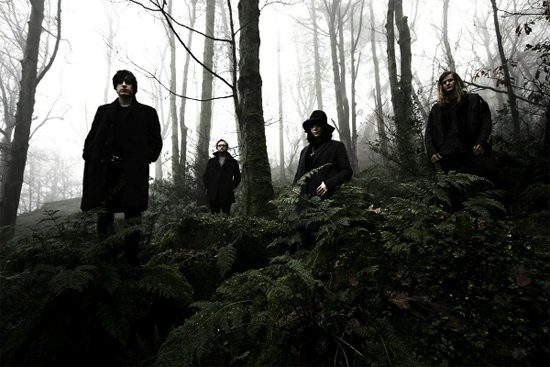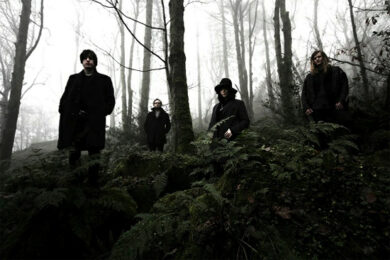Native New Yorker Jim Sclavunos of Teenage Jesus/Grinderman/The Cramps/et cetera fame was spotted in Armley in Leeds recently. What compelled him to pay a visit to one of West Yorkshire’s less salubrious suburbs? He certainly wasn’t there to take in the sights – Armley’s more notable landmarks include a prison and a co-op supermarket. No, he was in fact drawn northwards by the gloriously heavy sound of Black Moth. The hirsute drumming legend graced the band’s Armley rehearsal space with his dapper presence, before taking over production duties on their debut album The Killing Jar. The result is a pummeling beast indebted to the massive riffs of Black Sabbath, the pneumatic drumming of The Melvins and the trippy vocal style of Jefferson Airplane’s Grace Slick.
Be warned. It’s an album that’s likely to provoke involuntary air-drumming in public places. Highlights include the hypnotically mosh-inducing ‘Blackbirds Fall’ with its strident sparring of riffs and drums and ‘Spit Out Your Teeth’s’ honeyed vocals and frenzied guitars. It is a primal and relentless journey into a kingdom of darkness.
Black Moth are fronted by the formidable Harriet Bevan, who grew up on a diet of grunge and proto punk. A fan of L7, she shares that band’s defiant attitude and powerful presence. However, she is also keen to assert that the band is not defined by the gender of its lead singer. The Quietus spoke to her about the band’s evolution, working with Sclavunos and about how she is more than equipped to take on any prejudice.
How did the band form?
Harriet Bevan: Black Moth was the result of an ever-evolving project that eventually developed a purpose. Jimmy (guitar) and I met in school and have been in bands together for years. Dave (bass) joined us when we were at university and we formed a 60s garage band called The Bacchae who were influenced by The Stooges, The Sonics, etc. Dom (AKA Doom McCready) joined us on drums a couple of years ago, quickly establishing a far heavier and more formidable rhythm section than we’d ever had in the past. Our latest addition, Nico, only joined us on second guitar early 2012.
You started off as a garage rock band The Bacchae. How did the heavier sound emerge?
HB: We were always pretty obsessed with music from the 60s/70s. Those influences were very much evident in The Bacchae. I suspect that as we got deeper into psych, hard rock and proto-punk, we followed a chronological progression into the birth of doom and heavy metal. We found that the songs in our set that we got the biggest kick out of playing live were always the heavy, bluesy ones or the teeth shattering punk attacks.
As our tastes broadened, we lost our atavistic, overtly ‘retro’ tendencies and pushed nostalgia aside. The bands of recent times that speak to us and seem most relevant are the abrasive, the sleazy and the heavy. It’s the slow, sludgy riffs and that really do it for us. Black Moth are a band of 2012 and we want to sound like one.
Jim Sclavunos produced your album. How did you get involved with him? You’ve achieved quite an intense sound. Was he demanding?
HB: Jim certainly cracked the whip, but this is something for which we will be forever grateful. He gave us a kick up the arse to be the best band we can possibly be, and never settle for anything less than our full potential. His sky-high standards are unshakeable. Working with him made us raise our game massively and we are all better musicians for the experience. We wanted to prove ourselves, and with him we were able to produce something pretty special. The album is exactly what we wanted it to be: heavy yet melodic, and inexplicably weird/schizophrenic.
It certainly wasn’t all hard graft though; we had a hilarious time in the studio fooling around and experimenting with everything from mangled cowbell to goblin voices (subtle, but trust me it’s there in the mix). Mr. Jim looked immaculately sharp every single day in three-piece suits, but that didn’t stop him crawling around on his knees twiddling with knobs and belting up and down the stairs like a man possessed when the occasion demanded his energy. And he even made the trip up to our grotty little rehearsal room in Armley for pre-production! His presence was invigorating as he became so involved with us whilst we were playing, directing us with his tambourine and eventually even began to feel like part of the band.
Tennessee Williams’s poem Lament for the Moths was one of the inspirations behind the band’s name. Tell us a bit more about that.
HB: I was a fan of the Manic Street Preachers in my early teens, mainly because of their lyrical content and daring to be political, personal and literary at a time when music was predominantly quite macho and anti-intellectual. They even used to send out reading lists to fans. I always loved how their songs unlocked fascinating stories and introduced me to a world of transgressive literature and art that they didn’t tell you about in school. One of the motifs that seemed to keep cropping up was that of the moth. I soon learned that this came from Tennessee Williams’ poem Lament for the Moths, where the moths are the artists of the world, bronze flakes, delicate but gleaming, and stricken by a plague. Their generous souls are perpetually downtrodden by the world’s mammoths. It struck a chord with me as an extraordinarily accurate analogy for the artist trying to justify his/her existence in our troubled times.
I heard an interesting story about black moths. In the North of England there used to be a type of moth that was mainly grey in colour but that had black mutations occasionally. The moths would alight on the silver birch trees. The grey moths were camouflaged from predators. The black moths were always eaten. Then after the industrial revolution soot from the mills blackened the trees, so suddenly the black moths were camouflaged and the grey ones were visible to predators. That’s how the black moth began to flourish. Can you think of any instances in your life where you found that being different changed from being a problem to becoming an advantage?
HB: As an angsty young mosher, it always struck me as hauntingly poetic that while the world seems to be getting blacker and blacker, darker and darker as we slowly destroy it, nature is darkening accordingly. Perhaps we respond to our metaphorically darkening conditions, by producing heavier, darker and more disturbing music, much like those little moths got darker in their suffocatingly sooty environment. Many have suggested that it is no coincidence that heavy metal was born in the Black Country, the most intensely industrialised area of Britain during the Industrial Revolution.
Not necessarily being different but thinking differently is always an advantage. Our similarities are our bond and our differences are our strengths. We owe it to ourselves to persistently question and challenge the status quo head-on, as a way of life.
I read somewhere that you wanted to do an L7 cover. I’ve been listening to Smell The Magic a lot recently. Some of the themes remind me of the frustrations I felt when I was living in Leeds in my early 20s. Do you think that the heavier sound might be borne out of that kind of frustration? If so, can you tell me a bit about the challenges you face as a woman fronting a band? Do you think that being a female fronted band has been a help or a hindrance?
HB: I’m not sure about frustration. I love that album too. It’s one of my favourites, but I’ve always found it pretty empowering and I can’t get enough of their wild live footage. I really dig their ferocious approach, dirty riffs and snarling lyrics. I take great pleasure in quoting lyrics such as "she’s got so much clit she don’t need no balls," and watching the boys go all silly and squeamish. I think L7’s work needs to reach many more girls and boys than it is currently reaching though. That frustrates me. Somehow the male grunge acts of the 90s have held a firm place in the record collections of each new generation of music fans to this day, but I always felt that bands like L7 and Bikini Kill have comparatively slipped out of the wider public memory.
My own gender has never really felt like an important issue in our music. If we were a single-sex band, perhaps our interests would be more gendered, but as things are, we are blissfully liberated from any gender clichés. Members were elected for their abilities, creativity and most importantly how much fun they were.
In all honesty, I have never experienced overt sexism in the music scene I involve myself with. I’m sure I’m not the only female musician who has turned up for sound check only to be shown the way to set up the merch stall or delicately ushered out with the implication that band "WAGs" can join in later, but the guilty males have always been horrified by their mistake and very apologetic (once I have made them suffer dearly for their presumptions)! But rest assured if I did come up against any deliberate prejudice there would be hell to pay; you have to be pretty tough. It’s true that there are still strikingly few female musicians in rock music. I’m not entirely sure why this is the case but I would encourage more ladies to get stuck in as it’s just about the most fun you can have in the world, even if it is bloody hard work!
I haven’t seen you live yet. You mention Donita Sparks and Iggy Pop as performers you admire. They have both done some famously shocking things on stage. Have you got any outrageous live stories?
HB: Not particularly… it hasn’t occurred to me to get naked or anything yet. We tend to let the music do the talking. Donita Sparks’ main mission was to say "You know what? If the boys can do it, I can do it. Harder. And fuck you for ever thinking otherwise."
Iggy’s energy onstage is frankly out of this world. I don’t mind admitting that I am a little bit obsessed with the Stooges. They literally embody the concept of Raw Power and being in their audience is as close to a Bacchic frenzy as I have ever experienced at a gig. Black Moth believe that every live show should be like this. I try to channel Iggy and similarly Lux Interior for their wild abandon, but that’s easy really because it’s what happens naturally when under the influence of dirty riffs and alcohol.
I have noticed that when male rockers do outrageous things they get called a "fucking legend" when women do the same they get called "crazy bitches". Do you worry that you might get vilified?
HB: No, not one bit. You’re absolutely right, of course. I just don’t care about it happening to me. I would fight back twice as hard. There’s no excuse for that sort of chauvinism in rock media these days, with decades of powerful female musicians and spokespersons behind us.
The Killing Jar is out now through New Heavy Sounds.




